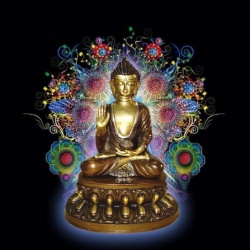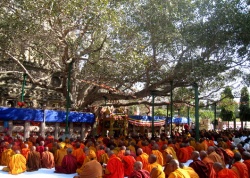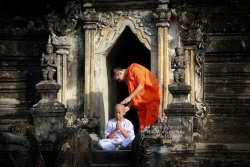Maitri
Maitri; Loving-kindness. mettā
Cultivating Unconditional Friendliness to Oneself
About Maitri Pema with texts at Gampo Abbey Maitri is translated in a lot of ways, maybe most commonly as love, but the way Chogyam Trungpa Rinpoche translated it was unconditional friendliness and in particular unconditional friendliness to oneself.
So I teach about maitri a lot. In fact, sometimes I think it's the only thing I teach. I also teach about compassion a lot, but actually compassion is a form of maitri so this unconditional friendliness to oneself, it seems to be what most of us do not have.
This is very interesting because there was a conference in Dharamsala with His Holiness the Dalai Lama and it was with Western Buddhist teachers.
Sharon Salzburg, who's a teacher of western insight meditation, was talking to His Holiness the Dalai Lama and explaining how in teaching in the West one of the things that teachers always encountered was how widespread it was that people were very hard on themselves. That when the teachings were taught in a traditional way, sometimes they simply didn't communicate because we were so good as a group of people at taking whatever we heard and turning it against ourselves.
For instance, there could be some excellent teaching on the difficulty, the pain that comes from ego clinging and that teaching could be taught in a very traditional way and then people could hear it, and somehow people could come out feeling bad about themselves. Instead of feeling inspired or uplifted to heal themselves, they'd come out feeling bad about themselves.
She was explaining this and His Holiness the Dalai Lama stopped her and said he didn't know what she was talking about. She tried to keep explaining that people have a low opinion of themselves. There's a lot of self-criticism, self-loathing, and things like this. And somehow, still he didn't really seem to understand. So he went around the room and asked all the Western teachers if they knew what she was talking about. And, of course, everybody knew what she was talking about.
When it had gone all the way around, he said, Well that's very interesting. There is a difference between the Tibetan people, that he knows so well, and the people of the West.
This would be called, in terms of what I'm going to talk about tonight, lack of maitri, not having maitri.
So often when I teach on this subject it gets misunderstood as meaning something like self-indulgence. One time, somebody came to Gampo Abbey to do a program there who had read The Wisdom of No Escape, which was the first book that I wrote. She came because she liked the whole emphasis on making friends, developing an unconditional friendship with oneself.
We were into the second day of sitting, sort of late afternoon, and at one point she just stood up and stretched her arms and made this very loud yawn, and laid down on the floor. I was sitting in the front of the room as the leader of the meditation. I'm sitting there, and of course you would never know by looking at my face that I'm at all noticing what's going on (audience laughter), but I'm thinking in my mind, "What in the hell is she doing?"
Afterwards I asked her what she was doing, and she said, "You know, I just took your words to heart." She said, "My back was hurting, and my knees were hurting, I was having a difficult time. So I was just friendly to myself." Then I realized I had to stress the teachings on discipline some more.
There was a story about the Zen master Suzuki Roshi. This was a situation where his students had been sitting and they were 3 or 4 hours into a very hard sitting period, a sesshin. The person who told the story said every bone in his body was hurting, his back, his ankles, his neck, his head, everything hurt.
Not only that, his thoughts were totally obsessed with either "I can't do this, I'm worthless. There's something wrong with me. I'm not cut out to do this." It was vacillating between those thoughts and "This whole thing is ridiculous. Why did I ever come here? These people are crazy. This place is like boot camp." His mind and body were just aching. Probably everyone else in the room was going through something similar.
Suzuki Roshi came in to give the lecture for the day and he sat down. He started to talk very, very, very slowly and he said, "The difficulty that you are experiencing now..." And that man was thinking, "will go away."
And he said, "This difficulty will be with you for the rest of your life."
So that's sort of Buddhist humor.
But it is also the essence of maitri. It seems to me in my experience and also in talking to other people that we come to a body of teachings like the Buddhist teachings or any spiritual path, to meditation in some way like little children looking for comfort, looking for understanding, looking for attention, looking somehow to be confirmed. Some kind of comfort will come out of this. And the truth is actually that the practice isn't about that. The practice is more about somehow this little child this I, who wants and wants and wants to be confirmed in some way.
Practice is about that part of our being that, like that finally being able to open completely to the whole range of our experience, including all that wanting, including all that hurt, including the pain and the joy. Opening to the whole thing so that this little child-like part of us can finally, finally, finally, finally grow up.
Trungpa Rinpoche once said that was the most powerful mantra, Om Grow Up Svaha.
But this issue of growing up, it's not all that easy because it requires a lot of courage. Particularly it takes a lot of courage to relate directly with your experience. By this I mean whatever is occurring in you, you use it,.
You seize the moment? moment after moment? you seize those moments and instead of letting life shut you down and make you more afraid, you use those very same moments of time to soften and to open and to become more kind. More kind to yourself for starters as the basis for becoming more kind to others.
One time when I was a child, I was feeling very upset and angry at one point. I think I was around seven or eight. And there was this old woman, who I later become very close to. But the first time I ever met her, I was walking down the street kicking stones with my head down, and I was feeling very lonely. I was basically feeling that nobody loved me very much and that people weren't taking care of me. So I was walking along angry at the world, kicking stones. And this woman said, "Child, don't let the world harden your heart."
And I always remember that. It was the first real teaching I received, I think. It's still a teaching I remember. And in terms of this teaching on maitri, this is really the key. People's lives, through all of time, have had a lot of difficulty in them The Buddha's first teaching was that there is suffering in life,
If you're born as a human being , there's suffering. At the very least, there's the suffering of illness, of growing old and of death at the end. Not to mention that the more you love are able to open, there's the suffering of not getting what you want and of losing what you do want. Just some inevitable sufferings.
Nowadays, this is an especially difficult time in the history of this planet, Earth. it's a difficult time. And in times of difficulty, people get very frightened. Often when I'm teaching a lot of the questions are that people ask about just the subject. People inevitably say, "Yes, but it's dangerous, it's getting more and more dangerous just to walk down the street. We need to protect ourselves."
I think the point is when our lives are difficult, in small ways or large ways, when we're going through a lot emotionally, or when difficult things are happening in our environment, do those things cause us to become more uptight and afraid. or do those very same things, when the teachings are applied, soften us and can open us?
To me, this is how I practice and this is the most important thing. You never know what's going to happen to us. In any day of our lives you never know what's coming. That's part of the adventure of it actually, but that's what makes us scared, is that we never know. And we spend a lot of time trying to control it so that we could know, but the truth is that we don't really know.
Really, I think a lot of people, like children, you're wanting some kind of practice that's not going to take you into anything uncomfortable but at the same time you want the practice to heal you. And it just doesn't work like that.
The question is how do you relate when things are uncomfortable? That's really the question.
As far as I'm concerned, in terms of spiritual path, that's the main question: how do you relate with the difficulties? How do you relate with the feelings you have and the situations you find yourself in?
This particular teaching on the Four Limitless Ones, on maitri, compassion, joy and equanimity is really a teaching on how to take the situations of your life and train- actually train- in catching yourself closing down, catching yourself getting hard, and training in opening at that very point, or softening. In some sense reversing a very, very old pattern of the whole species, which is a pattern of armoring ourselves. It's sort of like the essence of the whole Path is in that place of discomfort and what do you do with it? [1]




